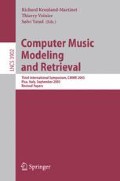Abstract
Metris is a version of the Tetris game that uses a player’s musical response to control game performance. The game is driven by two factors: traditional game design and the player’s individual sense of music and sound. Metris uses tuning principles to determine relationships between pitch and the timbre of the sounds produced. These relationships are represented as bells synchronised with significant events in the game. Key elements of the game design control a musical environment based on just intonation tuning. This presents a scenario where the game design is enhanced by a user’s sense of sound and music. Conventional art music is subverted by responses to simple design elements in a popular game.
Access this chapter
Tax calculation will be finalised at checkout
Purchases are for personal use only
Preview
Unable to display preview. Download preview PDF.
References
Narushima, T.: Tritriadic Chimes: Bells in Just Intonation (sound installation). MicroFest 2001, Pomona College, Claremont CA (2001), http://www2.hmc.edu/~alves/microfest2001schedule.html
Schiemer, G., Havryliv, M.: Viral Firmware: What Will I Wear Tomorrow? In: Australasian Computer Music Conference 2004, Victoria University of Wellington (2004)
Schiemer, G., Alves, B., Taylor, S.J., Havryliv, M.: Pocket Gamelan: Developing the Instrumentarium for an Extended Harmonic Universe. In: International Computer Music Conference 2003, Singapore University (2003)
delire + pix “q3apd”, http://selectparks.net/archive/q3apd.htm
Todorovic, V.: *tadar.game music, http://www.tadar.net/
Brown, A., Sorenson, A.: jMusic: Music Composition in Java, http://jmusic.ci.qut.edu.au
Chen, H.S.: Generation of Three-Dimensional Cellular Automata. In: Generative Art 2003, Politecnico di Milano University (2003)
Elliot, J.: Transmusic: Cellular Automaton Music (2001), http://jmge.net/camusic.htm
Millen, D.: An Interactive Cellular Automata Music Application in Cocoa. In: International Computer Music Conference 2004. Miami University (2004)
Miranda, E.R.: CAMUS: A Cellular Automata Music Generator (2002), http://website.lineone.net/~edandalex/camus.htm
Reiners, P.: Cellular Automata and Music: Using the Java Language for Algorithmic Music Composition (2004), http://www-106.ibm.com/developerworks/java/library/j-camusic/
Reiners, P.: Automatous Monk: The Cellular Automata Music Composition Program (2004), http://www.automatous-monk.com
Talmudi, A.K.: Evolving Decentralized Musical Instruments Using Genetic Algorithms. In: International Computer Music Conference 2004, Miami University (2004)
Schiemer, G., Havryliv, M.: Pocket Gamelan: A Pure Data Interface for Mobile Phones. In: New Interfaces for Musical Expression 2005, British Columbia University (2005)
Schiemer, G., Havryliv, M., Sabir, K.: Pocket Gamelan: A J2ME Environment for Just Intonation. In: International Computer Music Conference 2004. Miami University (2004)
Narushima, T.: Composing for Carillon: Exploring the Relationship Between Tuning and Timbre, MMus thesis (2003)
Obata, J., Tesima, T.: Experimental Investigations on the Sound and Vibration of a Japanese Hanging-Bell. Japanese Journal of Physics 9, 49–73 (1933-1934)
Doty, D.: The Just Intonation Primer: An Introduction to the Theory and Practice of Just Intonation, 2nd edn., p. 13. Just Intonation Network, San Francisco (1994)
Chalmers, J.: Tritriadic Scales with Seven Tones. Xenharmonikôn 9, 3–20 (1986)
Chalmers, J.: Tritriadic Scales with Seven Tones, Part Two: Derived Forms and Structural Properties. Xenharmonikôn 10, 20–30 (1987)
Chalmers, J.: Tritriadic Scales with Seven Tones, Part Three: The M->T and D->M Matrices. Xenharmonikôn 12, 40–68 (1989)
Op de Coul, M.: Scala Home Page (2004), http://www.xs4all.nl/~huygensf/scala
Partch, H.: Genesis of A Music: An Account of a Creative Work, its Roots and its Fulfilments, 2nd edn. Da Capo Press, New York (1974)
Sethares, W.: Tuning, Timbre, Spectrum, Scale. Springer, London (1998)
Shepard, R.N.: Circularity in judgments of relative pitch. Journal of the Acoustical Society of America 36, 2345–2353 (1964)
Cederberg, P.: Online Tetris Game (2005), http://www.percederberg.net/home/java/tetris/tetris.html
Author information
Authors and Affiliations
Editor information
Editors and Affiliations
Rights and permissions
Copyright information
© 2006 Springer-Verlag Berlin Heidelberg
About this paper
Cite this paper
Havryliv, M., Narushima, T. (2006). Metris: A Game Environment for Music Performance. In: Kronland-Martinet, R., Voinier, T., Ystad, S. (eds) Computer Music Modeling and Retrieval. CMMR 2005. Lecture Notes in Computer Science, vol 3902. Springer, Berlin, Heidelberg. https://doi.org/10.1007/11751069_9
Download citation
DOI: https://doi.org/10.1007/11751069_9
Publisher Name: Springer, Berlin, Heidelberg
Print ISBN: 978-3-540-34027-0
Online ISBN: 978-3-540-34028-7
eBook Packages: Computer ScienceComputer Science (R0)

